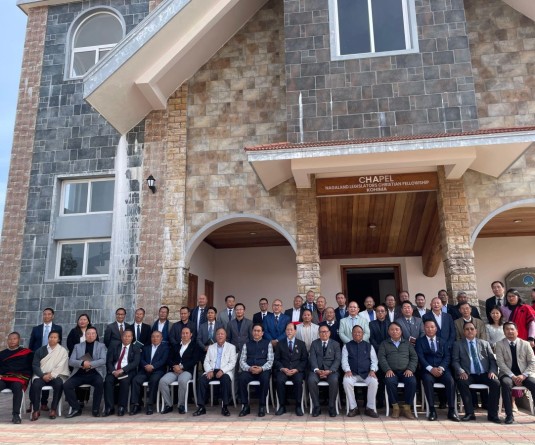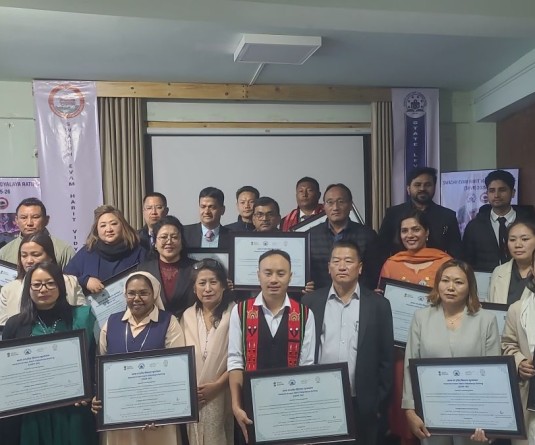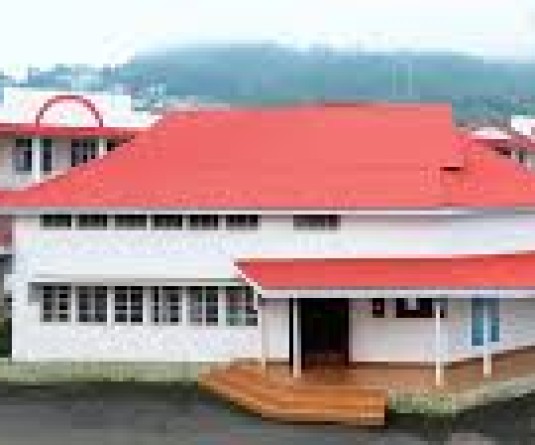A large crowd of protestors take part in a public rally march against decisions to scrap the Free Movement Regime (FMR) and construct fence along the Indo-Myanmar international border in Longway Village on February 3. (Photo Courtesy: Manom Taiwangshu)

Morung Express News
Longwa/Dimapur | February 3
In the strongest protest yet against the decisions to scrap the Free Movement Regime (FMR) and erect a fence along the Indo-Myanmar international border, a public rally was held in Longwa today, calling for a reconsideration of the decision.
The rally, organised under the aegis of the Konyak Union (KU), held significant importance as Longwa village straddles the official territories of both India and Myanmar and is ruled by one Chief Angh, the traditional Konyak polity’s king or chief.

According to sources, thousands of people joined the rally, which began with a public march from Longwa Students’ Union Park and culminated at the Chief Angh’s residential complex, where the main programme was held. Hundreds of protesters from Myanmar’s Naga Self-Administered Zone also participated.
The demonstrators carried placards expressing their discontent, with messages such as “Walls create hatred, not security!”, “Recognise our ancestral lands, not imaginary borders”, “A border fence divides families, not just lands!”, and “Free movement inside our Konyak territory is our right; don’t snuff it out”. Another read, “Respect Indigenous rights, not colonial legacy!”, reinforcing concerns about the arbitrary drawing of borders.

The sentiment was echoed in a representation submitted to the Nagaland Governor, urging his office to take up the matter with the Government of India (GoI) and advocate for reconsideration of the decisions to revoke the FMR and construct a border fence on humanitarian grounds.
‘Arbitrary’ borders, loss of vital connections
Signed by KU President Tingthok Konyak and General Secretary Manpang K Wangyen, the representation highlighted that the decisions regarding the FMR and border fencing would have a profoundly adverse impact on the Konyak Naga community, whose “ancestral lands and people have been inseparably connected on both sides of the border since time immemorial.”

It further pointed out that the demarcation of the India-Myanmar border was the result of arbitrary colonial decisions, beginning with the Treaty of Yandabo in 1826, followed by later modifications, and finalised in the Yangon Agreement on March 10, 1967.
“These historical agreements were made without the consent or knowledge of the Konyak Naga community, whose territories were split without regard for the indigenous population’s cultural, social, and familial ties,” it stated.
The KU emphasised that the Konyak community has always lived as one people, sharing land, resources, and kinship across this “imposed border” and any villages, including those within Indian territory, have large portions of their agricultural lands situated in Myanmar.

The fencing of this boundary, it maintained, would not only deprive them of their farmlands but also severely disrupt their livelihoods, causing immense hardship. It would also result in the loss of vital connections for Konyak families residing in Myanmar, who rely heavily on the Indian side for ration, daily needs, and basic necessities.
According to the KU, the situation is particularly “distressing” in Longwa village, where the border line arbitrarily cuts through the heart of the settlement.
“It is inconceivable and deeply inhumane to consider erecting a fence through the centre of such a community or to impose pass permits on villagers who have lived freely across this land for generations,” it asserted.
Misrepresentation of the realities
To this end, the KU stated that if fencing is deemed necessary, it should “follow the traditional boundary lines of the Konyak Naga community and not the artificial lines drawn by colonial and post-colonial authorities.” It further declared that the Konyak community would not accept any forceful division of its land and people.
The union also objected to the scrapping of the FMR, which was implemented in 2018 to acknowledge the close ties between tribal communities on both sides of the border.
.webp)
This regime, it contended, has been crucial in preserving the cultural integrity and social fabric of border communities. The Ministry of Home Affairs’ decision to revoke the FMR and fence the 1,640 km boundary, it added, is based on “false premises and a misrepresentation of the realities faced by indigenous communities.”
The KU also pointed out that the move contradicts the GoI’s own stated principles of the Neighbourhood First and Act East policies, which aim to foster closer trade, connectivity, and people-to-people ties with Myanmar and Southeast Asia.
“It marks a significant reversal of the free border movement that has existed for generations between India and Myanmar,” it added.
Accordingly, the KU sought the Nagaland Governor’s intervention on the issue through a representation submitted via the Deputy Commissioner of Mon.
“The Konyak Union remains firm in its stand to protect the rights, land, and unity of our people, and we hope that your intervention will lead to a more just and compassionate resolution,” it stated.






